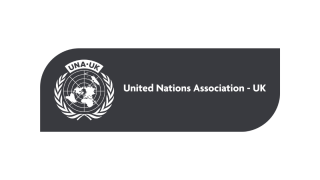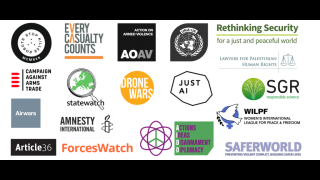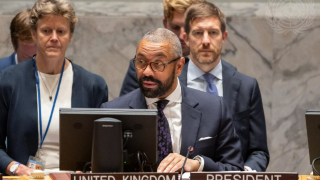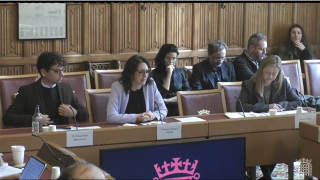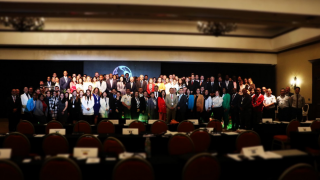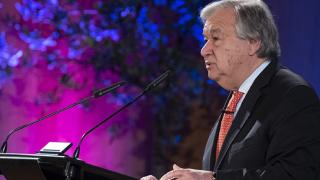
Secretary-General António Guterres’ new agenda for disarmament urges states to reduce the range of risks posed by weapons of mass destruction, conventional weapons, and emergent weapons including fully autonomous weapons. It also outlined actions the UN will take in support of this agenda and integrated its objectives with the 2030 Agenda for Sustainable Development.
On nuclear weapons, Mr Guterres used his speech to outline the grave reality: arms control agreements are under threat like never before. He called on states which possess nuclear weapons to start respecting their responsibility to lead efforts on non-proliferation and disarmament:
“This must start with meeting their existing obligations, with concrete benchmarks and timelines. Some of these are decades overdue.”
Guterres appealed for Russia and the United States to resolve their dispute over the Intermediate-Range Nuclear Forces Treaty; extend the New START treaty on strategic offensive arms (due to expire in three years); and to take new steps towards reducing nuclear stockpiles.
Perhaps in response to moves earlier this year, by both the United States and Russia, to increase the role of nuclear weapons in their security strategies, Mr Guterres urged states to reduce the significance of these weapons in military doctrines.
UNA-UK raised many of these concerns in an article published by Reaching Critical Will at the recent Preparatory Committee for the Nuclear Non-Proliferation Treaty in Geneva.
Before the day was out, the UN Secretary-General's optimism reagrding planned talks between the United States and North Korea had to be updated, and a statement released expressing concern over the cancellation of those talks.
On conventional disarmament, Mr Guterres noted the troubling trend towards armed violence in heavily populated areas where “90% of the casualties are civilians” and called for “appropriate limitations, common standards and operational policies on the use of these weapons in residential areas.” However, beyond voicing concern over weapons flows to conflict-prone regions, Mr Guterres' speech stopped short of urging states to restrict arms exports to states guilty of violations of international humanitarian law - something UNA-UK is campaigning on.
Mr Guterres also announced a new initiative to combat the illicit circulation and trade in small arms at the national level and across borders, resourced by the Peacebuilding Fund.
The third strand to the agenda related to emergent weapons. Mr Guterres signalled his support for a prohibition on lethal autonomous weapons systems, stating that he would support states to create a “legally binding arrangements, to make sure human beings control the use of force at all times.”
Find out more about UNA-UK’s work on lethal autonomous weapons systems
Download the Secretary-General's agenda for disarmament
Full transcript: Securing our common future: An agenda for disarmament
UN Secretary-General, Antonio Guterres, University of Geneva, Thursday 24 May 2018
Excellencies,
Dear students and faculty of the University,
Ladies and gentlemen,
It is a pleasure to be here with you today, to focus on a subject of great global anxiety: the threat posed by weapons of all kinds.
I wanted to launch my disarmament agenda here in Geneva, the city of peace, diplomacy and humanitarian action; home to a community of peacemaking institutions, where many conflicts have been prevented and resolved.
I thank the University of Geneva for generously hosting us.
In the past few weeks and months, arms control has been in the news every day, sometimes in relation to Iran and Syria, sometimes the Korean Peninsula.
Let me say a few words on these recent developments.
I strongly hope the planned meeting in Singapore between the President of the United States and the leader of the Democratic People’s Republic of Korea takes place. This could be an historic step towards the verifiable denuclearization of the Korean Peninsula.
And I welcome all actions, by the European Union and others, to work with Iran to preserve the Joint Comprehensive Plan of Action.
Agreements like these, between countries and groups of countries, are essential to global peace and security.
But the disarmament agenda I am launching today goes beyond nuclear weapons and weapons of mass destruction.
Disarmament concerns every country, and all weapons, from hand grenades to H-bombs.
Deadly weapons put us all at risk. Leaders have a responsibility to minimize that risk.
The paradox is that when each country pursues its own security without regard for others, we create global insecurity that threatens us all.
Disarmament -- including arms control, non-proliferation, prohibitions, restrictions, confidence-building and, where needed, elimination -- is an essential tool to secure our world and our future.
Dear students, ladies and gentlemen,
We are living in dangerous times.
Cold war tensions have returned -- to a world that has grown more complex.
Many of you were not even born during the last Cold War, when the world held its breath while two superpowers vied for influence. We were fortunate to emerge without a nuclear exchange, despite many accidents, near misses and false alarms.
We now seem to be moving towards a multipolar world. Global relations are more complicated and unpredictable. Mechanisms for contact and dialogue, that once helped to defuse tensions and make sure that a single incident did not spiral into a major conflagration, have eroded.
At the same time, the nature of war has changed.
Conflicts have become more frequent, longer and more devastating for civilians. Civil wars are interconnected with regional and global rivalries. They may involve violent extremists, terrorists, organized militias and criminal elements. These groups are equipped with a vast array of weapons, from guns to drones to ballistic missiles – and they are always looking for more.
Global military spending and arms competition are increasing, particularly in the most dangerous parts of the world.
More than $1.7 trillion dollars was spent last year on arms and armies – the highest level since the fall of the Berlin Wall. That is around 80 times the amount needed for global humanitarian aid.
Chemical weapons have returned. Divisions in the international community have prevented action against them.
Devastating high explosives designed for the battlefield are being used in cities.
And artificial intelligence and autonomous systems are enabling new weapons that challenge existing laws and conventions.
Meanwhile, efforts to end poverty, advance health and education, fight climate change and protect our planet are starved of resources.
This is the backdrop to my agenda for disarmament.
Dear students, ladies and gentlemen,
My agenda has three priorities: disarmament to save humanity, disarmament that saves lives, and disarmament for future generations.
First: disarmament to save humanity aims to reduce and eliminate weapons of mass destruction: nuclear, chemical and biological.
The total elimination of nuclear weapons is in the DNA of the United Nations. Indeed, it was the subject of the very first resolution adopted by the General Assembly in 1946.
Today, the total elimination of nuclear weapons remains our priority, to which I reaffirm my commitment. But efforts to achieve this goal are in state of severe crisis.
Our world is going backwards.
Throughout and immediately after the Cold War, difficult negotiations yielded agreements that reduced arsenals, outlawed nuclear testing, and dismantled whole categories of missiles.
Communication channels enhanced transparency, built confidence and reduced risks.
Three ex-Soviet States – Belarus, Kazakhstan and Ukraine – repatriated nuclear weapons in their possession. South Africa unilaterally dismantled its nuclear arsenal. Other states took important positive steps.
World leaders were fluent in the language and logic of arms control; they understood that it was integral to security.
But the agreements of that era are now threatened as never before.
Strategic dialogue between the nuclear-weapon states remains limited.
There are no bilateral negotiations underway between Russia and the United States for further nuclear arms reductions.
Governments are pouring resources into updating old weapons systems, developing new ones, and entering into what many see as a new arms race, based on quality rather than quantity.
Some 15,000 nuclear weapons remain stockpiled around the world. Hundreds are ready to be launched within minutes. We are one mechanical, electronic or human error away from a catastrophe that could eradicate entire cities from the map.
We all agree that the Nuclear Non-Proliferation Treaty is central to the maintenance of international peace and security.
This landmark treaty, which is nearly 50 years old, has successfully limited the number of states that possess nuclear weapons to less than ten. Its safeguards regime provides assurance of the exclusively peaceful nature of civil nuclear programmes.
But beyond that, the Nuclear Non-Proliferation Treaty is also essential to preserving an environment conducive to disarmament.
Non-proliferation and disarmament are two sides of the same coin. Together, they constitute a reciprocal legal arrangement between the nuclear and non-nuclear states.
Reversal on one side will lead to reversal on the other.
I appeal to all states, including non-parties, to adhere to the non-proliferation and disarmament obligations and commitments under the NPT.
All States, nuclear and non-nuclear, must work together to bridge the gulf that divides them.
Some characterize the differences as a choice between humanitarian and security concerns. That is a false dichotomy.
Human security, national security and global security are indivisible. When people fear for their lives, their communities, societies and countries are at increased risk. When people enjoy safety, so do their countries and our world.
The Treaty on the Prohibition of Nuclear Weapons, adopted last year and central in the awarding of the 2017 Nobel Peace Prize, demonstrated strong international support for a permanent end to the threat posed by nuclear arms.
It was also a call to break the stalemate in nuclear disarmament negotiations.
Dear students, ladies and gentlemen,
The States that possess nuclear weapons have primary responsibility. They must prevent the use of nuclear weapons, reduce the danger of nuclear war, and lead efforts on non-proliferation and disarmament.
This must start with meeting their existing obligations, with concrete benchmarks and timelines. Some of these are decades overdue.
I appeal to Russia and the United States to resolve their dispute over the Intermediate-Range Nuclear Forces Treaty; to extend the New START treaty on strategic offensive arms, which is due to expire in just three years; and to take new steps towards reducing nuclear stockpiles.
Together with other States that possess nuclear weapons, they should urgently renew efforts towards reducing the dangers posed by these weapons, by taking concrete action in a number of key areas.
And here I will quote from the text of my Disarmament Agenda:
“These areas include reductions in overall stockpiles of all types of nuclear weapons; ensuring the non-use of nuclear weapons; reduction of the role and significance of nuclear weapons in military concepts, doctrines and policies; reductions in the operational readiness of nuclear-weapon systems; constraints on the development of advanced new types of nuclear weapons; increased transparency in nuclear-weapon programmes; and measures to build confidence and mutual trust.” End quote.
I will do everything I can to support such efforts.
Through their policies and actions, every government should work to ensure that the 72-year practice of non-use of nuclear weapons continues indefinitely and is universally understood to be an inviolable norm.
The same should hold true of the norm against nuclear testing. By constraining the development of new types of weapons, the Comprehensive Nuclear-Test-Ban Treaty put a brake on the arms race.
With the exception of the Democratic People’s Republic of Korea, all governments have upheld the moratorium on nuclear tests for the past two decades. Since 1996 when the treaty opened for signature, the international community has responded to all violations of this norm – and the Security Council adopted a resolution to support the Treaty in 2016.
I appeal for States that have not yet done so to join the Comprehensive Nuclear-Test-Ban Treaty without delay.
We need to preserve the valuable gains we have made, even as we forge new understandings and agreements.
Dialogue and negotiations are the only way forward and must guide our efforts.
I will work directly with Member States to facilitate dialogue among governments, including through the creation of informal platforms to explore new approaches and measures to reduce risks and build confidence.
We will redouble our work with experts at the technical level to develop practical measures to pave the way for a world free of nuclear weapons.
These should include further partial measures for disarmament, from strengthening and consolidating nuclear-weapon-free zones, to ending the production of nuclear material for weapons, limiting strategic nuclear delivery systems, and agreeing on approaches to verify disarmament.
Let us all work together to bring new urgency to achieve the universal goal of a nuclear-weapon-free world.
Dear students, ladies and gentlemen,
We will also take steps to end and prevent the use of other weapons of mass destruction, especially chemical weapons.
Since 2014, the fact-finding mission of the Organisation for the Prohibition of Chemical Weapons has examined 83 incidents involving the alleged use of chemical weapons in Syria. Investigators have said chemical weapons were used, or were more than likely to have been used, in 14 cases so far. Each use is a crime under international law. Their widespread use may also constitute a crime against humanity.
The Security Council has failed to meet its responsibility to ensure accountability for these attacks.
I am working with the Members of the Security Council to build new leadership and unity, to restore shared ownership and respect for the global ban on chemical weapons.
This must include creating a new and impartial mechanism to identify those who use them. We cannot allow continued impunity in Syria or elsewhere. I will also support efforts to strengthen the Chemical Weapons Convention and its institutional capacity, to ensure the full implementation of this landmark disarmament treaty. We will never accept the possession or use of chemical weapons.
We must also do more to increase our ability to uphold the ban on biological weapons.
Concerns around these weapons continue to grow as developments in science and technology make them easier to develop and use. But there is currently no organization or inspectorate body supporting the Biological Weapons Convention.
I will therefore work with Member States to establish a core standing mechanism to conduct investigations into any alleged use of these weapons, based on the authority given to me.
I will also explore long-term solutions, including strengthening the institutional capacity of the Biological Weapons Convention.
Strengthening the norms and conventions against chemical and biological weapons is in the interests of all humanity.
Dear students, ladies and gentlemen,
My second priority is disarmament that saves lives, by reducing and mitigating the impact of conventional weapons.
The widespread availability of these weapons, from improvised explosive devices to ballistic missiles, rockets, artillery and illicit hand guns, contributes to the armed violence that is causing chaos in many parts of the world.
Military industries are producing ever-more weapons. The arms trade is seeking ever-expanding markets.
Countries are building up massive stockpiles of conventional arms, especially in the most conflict-prone regions of the world.
We must counter these destabilizing trends. We have already seen how the prohibition and restriction of some conventional weapons can save and improve lives.
Anti-personnel landmines and cluster munitions have been banned for years; the Arms Trade Treaty that regulates the sale of weapons on humanitarian grounds came into force in 2014.
Despite these achievements, civilians continue to bear the brunt of armed conflict.
Beyond the appalling numbers of civilians killed and injured, conflicts are driving record numbers of people from their homes, often depriving them of food, healthcare, education and any means of making a living. At the end of 2016, more than 65 million people were uprooted by war, violence and persecution.
As armed conflict has moved from open fields into cities, explosive weapons are particularly deadly for civilians.
When explosive weapons are used in urban areas, some 90 percent of the casualties are civilians. These weapons also have a devastating effect on hospitals, schools, and water and electricity supplies.
That is why I will support Member States in developing appropriate limitations, common standards and operational policies on the use of these weapons in residential areas.
I will also support the collection of data on civilian casualties. We need more evidence to effect changes to policies, military operational procedures and behavior, and create stronger global standards to protect civilians.
Dear students, ladies and gentlemen,
The United Nations has sought to tackle the widespread availability of illicit small arms and ammunition from many angles: peace and security, gender equality, sustainable development, transnational crime, counter-terrorism and humanitarian action. United Nations peacekeepers often work on disarmament programmes around the world; they are an integral part of our work on sustaining peace.
But our work has been spread across twenty different agencies. It is fragmented and limited.
I am therefore launching a new initiative to combat the illicit circulation and trade in small arms at the national level and across borders. I will dedicate resources within the Peacebuilding Fund to support government action on illicit small arms and light weapons, including collection and destruction, and the development of legal and policy frameworks.
United Nations peacekeepers work on disarmament programmes around the world; they are an integral part of all our work on sustaining peace.
My initiative will have a strong basis in the 2030 Agenda for Sustainable Development, the world’s blueprint for peace and prosperity on a healthy planet.
Excessive spending on weapons drains resources for sustainable development. It is incompatible with creating stable, inclusive societies, strong institutions, effective governance and democracy, and a culture of respect for human rights.
There is also a strong gender dimension to this work. Almost universally, guns are infused with masculine characteristics. Men make up the overwhelming majority of the owners and users of firearms. Women are several times more likely to be victims of gun violence than perpetrators.
The presence of excessive and unregulated firearms exacerbates gender-based violence and shores up traditional gender roles and power relations. We must prevent a culture of violence and bloodshed, and a cycle that is difficult to break.
Dear students, ladies and gentlemen,
My third priority is disarmament for future generations.
Advances in science and technology are transforming many aspects of our lives for the better.
Technological progress has increased trade and prosperity, and improved living conditions in many parts of the world.
Technologies including big data and analytics, artificial intelligence and automation, should help us to combat and mitigate the impact of climate change, to protect our environment, and to create conditions for growth and development that benefit everyone.
But many of these developments are also enabling new weapon technologies with dangerous and repugnant applications.
They could open a new battle field, or start a new arms race.
Some developments could challenge existing legal, humanitarian and ethical norms. The prospect of autonomous weapons has already generated considerable public anxiety. Human beings must remain in control of the use of force at all times.
Some, like armed drones, could challenge long-standing interpretations of international law. We need common standards to promote accountability, transparency and oversight.
Some, like advances in gene editing and synthetic biology, could enable new types of biological warfare, making these prohibited weapons easier to use. This is another reason to increase the capacity of the Biological Weapons Convention.
The continued development of hypersonic, ballistic missiles and space-based weapons could create new threats to security and add new complications to nuclear disarmament.
Meanwhile, the malicious use of cyber space is growing and its impacts are becoming more widespread.
If there is a major outbreak of armed conflict in our world – and we all hope there is not – I am sure that it would be preceded by a massive cyber-attack.
There is consensus that international law, including the United Nations Charter, applies to cyberspace.
However, there is a lack of consensus about precisely how international law applies, and how States may respond to malicious or hostile acts, within the law.
Cyberattacks on critical infrastructure could have serious consequences for international relations, peace and security. We could even face the creation of cyberweapons of mass destruction.
The combined risks of new weapon technologies could have a game-changing impact on our future security.
Our joint disarmament efforts in this area must have a game-changing preventive impact.
There are many things we can do together.
Governments can improve oversight, transparency and accountability.
All States have a responsibility to determine whether new weapons they seek would be prohibited under international law.
I am prepared to make available my good offices to prevent conflict resulting from acts committed in cyber space.
I will support Member States to elaborate new measures, including legally binding arrangements, to make sure human beings control the use of force at all times.
I will bring together scientists and engineers who commit to developing science and technology for peaceful purposes. We urgently need their insights.
And I will explore opportunities for encouraging responsible innovation by the private sector.
I urge Governments to continue to explore multilateral measures for prevention and control.
Excellencies, ladies and gentlemen,
We cannot create a safer world for all through uncoordinated action. Disarmament works best when we work together: governments, experts, civil society and individuals.
As our expectations for disarmament evolve, so must these partnerships. Let us look at our principal multilateral forums, the Conference on Disarmament and the Disarmament Commission. Both will soon be 40 years old, and both have produced very little for the last half of their lifetimes.
It is past time to reinvigorate them.
This will require improved coordination, an end to duplication, better use of expertise, and above all, the political courage to shift positions. I will work with Member States and investigate possible ways to achieve this.
One way forward is to open them up to new voices and make them as inclusive and diverse as possible.
Women have a leading role to play in all our work for global peace and security. Several women have been awarded the Nobel Peace Prize for their role in achieving landmark disarmament treaties and in mobilizing global public opinion. Women must participate as decision-makers in all disarmament processes, and I am totally committed to doing all I can to support this.
And you, young people, are the most important force for change in our world.
I hope you will use your voices to make a difference: from giving your time and energy to causes that matter to you, to advocating and standing up for what you know is right.
You have opportunities to act locally, to volunteer and to work through civil society organizations.
Social media offers unprecedented tools to connect, to reach across borders and join with others around the world, through campaigns, non-governmental organizations and online communities.
The United Nations would like to work with you, to help you acquire the knowledge and skills to amplify your voices and lead the change we need.
I hope you will use your power and your connections to advocate for a peaceful world, free from nuclear weapons, in which weapons are controlled and regulated, and resources are directed towards opportunity and prosperity for all.
The United Nations was created with the goal of eliminating war as an instrument of foreign policy.
But seven decades on, our world is as dangerous as it has ever been.
Disarmament prevents and ends violence.
Disarmament supports sustainable development.
And disarmament is true to our values and principles.
This is why I am presenting this Agenda for Disarmament here today.
I urge all to step up.
Thank you, and I look forward to our discussion.
Image: UN Secretary-General António Guterres speaks at the University of Geneva, launching his Agenda for Disarmament, on 24 May 2018. UN Photo/Jean-Marc Ferre


